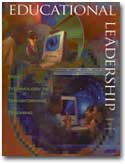New Standards Project Not the Driving Force
As someone much involved in Washington State's effort to improve education, I applaud your coverage of innovations in teaching and learning. I was disturbed, however, by an error in “The Certificate of Initial Mastery” (May 1995). Robert Rothman asserts that “a partnership of 17 states and 6 school districts—the New Standards Partnership—has been developing the certificate system” mandated by the Washington State Legislature. This is simply not true.
Washington State's Certificate of Mastery is not tied in any fashion to the New Standards Partnership. To create the impression that the New Standards Partnership is driving our work is a serious misrepresentation. When designed and implemented, our Certificate of Mastery will have flowed from our staff-developed high school assessments. Hundreds of Washington educators and community members are involved in an extensive process of developing higher academic standards and an assessment and accountability system to measure student progress on those standards.
Rothman's description of Shorecrest High School's senior project, developed by a remarkable principal and staff, was accurate. Shorecrest's creative efforts to voluntarily implement its school-level requirement will inform our process and help other high schools across the state, as well as those in the New Standards Partnership.
—Chuck Collins, Commission on Student Learning, State of Washington, Olympia, Washington
Toward a More International Association
From across the world in Saudi Arabia, we were thrilled to read that ASCD is planning to include more international content in Educational Leadership. International systems are as diverse and unique as the varied cultures and experiences of the individuals who interact within. We are different; our schools are different, and it is essential that we build in the time and commitment to discuss and exchange ideas.
One of the most difficult transitions for educators as they enter the overseas school systems for the first time occurs when they find that the research base from which they have successfully operated in the States cannot be canned and shipped in to their new base of operations. Instead, their experiences are valued as additional bits of fabric to weave into the rich tapestry of professional expertise already existing in overseas education.
Here at The Dhahran Academy, we are especially interested in learning about models of curriculum developed in the United Kingdom, Australia, and New Zealand, and hope to correlate those models with our educational mission in Saudi Arabia. We hope to share our experiences, through ASCD, with other international schools.
—Mary Hopkin, Dhahran Academy, Dhahran, Saudi Arabia
Editor's note: In keeping with ASCD's goal to become a more international organization, Educational Leadership will feature more articles about schools outside the United States. In this issue and in December/January (“Site-Based Management: Making It Work”), we will add extra pages to accommodate these articles. Readers, please let us know your reactions.
